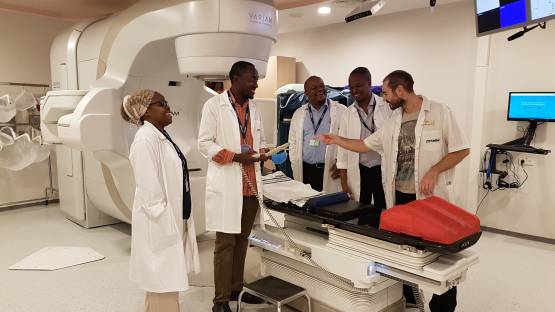Tanzanian cancer specialists have completed advanced radiotherapy training at leading Israeli cancer centres this month as part of United Republic of Tanzania’s upgrade of treatment services for common cancers. This leads the way for further opportunities to train African cancer professionals through a new partnership between the IAEA and Israel.
“We are proud to offer such critical training opportunities to medical professionals from Tanzania, combining a financial contribution for an IAEA project with in-kind support through training offered by specialists at our cancer care facilities,” said Osnat Luxembourg, Head of Medical Technology at Israel’s Ministry of Health.
Merav Ben-Avi, Director of External Relations and International Cooperation at Israel’s Atomic Energy Commission added, “This effort not only reflects Israel’s development priorities to strengthen human capacity and to transfer the latest know-how, but it also opens a new chapter in collaborating with the IAEA’s technical cooperation programme to support partner countries in addressing the growing cancer burden.”
In Tanzania, cancer poses an increasing challenge. According to the International Agency for Research on Cancer (IARC), over 42 000 people will be diagnosed with the disease in the country this year, with almost 29 000 people dying. These numbers are expected to increase by over 50 percent by 2030. Data from Business Daily Africa states that Tanzania has the second highest number of cancer deaths in East Africa after Kenya. A large proportion of cancer-related deaths in Tanzania are attributed to women’s cancers, with cervical cancer alone claiming 6 700 lives a year, according to IARC. Improved cancer services will help meet the increasing demand for strengthened health systems.
While radiotherapy is an essential tool in the treatment of many cancers, it is currently only being offered as a public service by the Ocean Road Cancer Institute (ORCI) in Dar es Salaam. With IAEA support, the Government of Tanzania is investing in additional radiotherapy facilities in the country, but, currently there is a great need for increased numbers of trained staff at ORCI to enhance the quality of services delivered.
In an effort to address this, the IAEA facilitated training for two radiation oncologists and two radiation therapists from ORCI at leading cancer facilities in Israel, namely the Assuta Ramat Hachayal Centre and the Sheba Medical Centre (Tel Hashomer). Areas included in the training were 3-dimensional radiotherapy planning and CT simulation.





